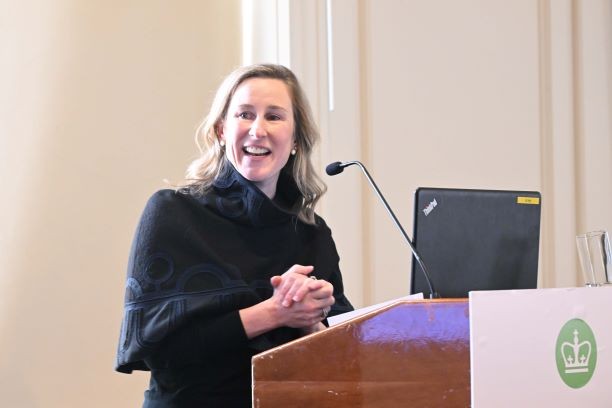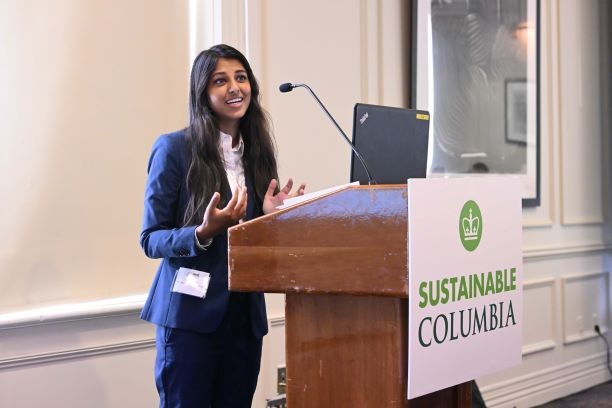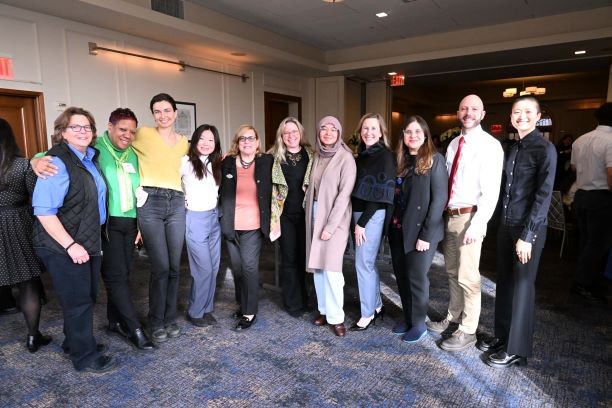Columbia University Commits to New York City Plant-Powered Carbon Challenge
Columbia Dining is the first signatory to the Plant-Powered Carbon Challenge, a NYC-wide initiative to reduce carbon emissions through plant-forward food.
As part of the challenge, Columbia Dining has committed to reducing its food-based carbon emissions 25% by 2030 through a plant-powered procurement strategy for its dining operations.
“As an inaugural member of the Plant-Powered Carbon Challenge, Columbia University is leading our private sector by enthusiastic example to help us draw down food-based emissions by 2030.”
Columbia Dining will develop and submit an action plan to reach the target, which will include measuring purchases to track its food-based carbon footprint and reporting on its progress.
The Office of Sustainability and Columbia Dining agreed to join the challenge at the recommendation of students participating in a capstone project in the Undergraduate Sustainable Development program at the Columbia Climate School.
Image Carousel with 4 slides
A carousel is a rotating set of images. Use the previous and next buttons to change the displayed slide
-
Slide 1: The announcement was made at the NYC Carbon Challenge meeting on December 5.
-
Slide 2: At the meeting, Jessica Prata, Assistant Vice President for Columbia University’s Office of Sustainability welcomed attendees and shared updates on Columbia’s own progress towards decarbonization.
-
Slide 3: Neeti Jain from the Office of Food Policy discussed the importance of the Plant-Powered Carbon Challenge.
-
Slide 4: The Sustainable Columbia and Columbia Dining team with faculty and students from the Undergraduate Sustainable Development program. (Left to right: Helen Bielak, Janice Erskine, Andreea Diaconu, Angela Ahn, Vicki Dunn, Professor Jenna Lawrence, Alin Risfenti, Jessica Prata, Samreen Afzal, Dan Allalemdjian and Sherrye Ye.

The announcement was made at the NYC Carbon Challenge meeting on December 5.

At the meeting, Jessica Prata, Assistant Vice President for Columbia University’s Office of Sustainability welcomed attendees and shared updates on Columbia’s own progress towards decarbonization.

Neeti Jain from the Office of Food Policy discussed the importance of the Plant-Powered Carbon Challenge.

The Sustainable Columbia and Columbia Dining team with faculty and students from the Undergraduate Sustainable Development program. (Left to right: Helen Bielak, Janice Erskine, Andreea Diaconu, Angela Ahn, Vicki Dunn, Professor Jenna Lawrence, Alin Risfenti, Jessica Prata, Samreen Afzal, Dan Allalemdjian and Sherrye Ye.
“At Columbia University we’re lucky to have the best and brightest students here to help us tackle this challenge. Through their research, they showed us that significant cuts [in scope 3 emissions] are possible through minor changes in our food purchasing,” noted Vicki Dunn, Assistant Vice President for Columbia Dining. The challenge complements other initiatives underway in Columbia Dining and as part of Columbia’s Plan 2030.
The Plant-Powered Carbon Challenge is a new initiative from the Mayor’s Office of Food Policy designed to activate the private sector in cutting NYC’s carbon footprint through climate-friendly, plant-powered food. Neeti Jain from the Office of Food Policy underscored that the challenge is meant to demonstrate that cuts to food-related emissions can be both an impactful, but totally feasible action as part of an organization’s overall sustainability plan.
“Columbia University must be a leader in addressing the realities of climate change. We know that food has a role in the reduction of scope 3 emissions, so it needs to have a critical place in our climate strategy. We are proud to step forward and commit to this challenge with the Mayor’s Office,” remarked Jessica Prata Ciancara, Assistant Vice President for the Columbia University Office of Sustainability.
The announcement was made at the NYC Carbon Challenge Meeting on December 5, 2023 organized by the Mayor’s Office of Climate and Environmental Justice and hosted at Faculty House by the Columbia University Office of Sustainability.
About Sustainable Columbia
Columbia University’s Plan 2030 is a ten-year strategic plan that outlines aggressive sustainability goals, grounded in climate science, for Columbia’s New York campuses to achieve net zero emissions by 2050. The plan uses the Science Based Target initiative (SBTi) and United Nations Environment Programme (UNEP) to establish principles and measurable targets that will help ensure Columbia will achieve this goal.
Photos by Eileen Barroso for Columbia University
